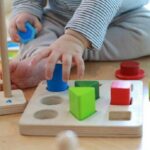While some parents may attribute this to mere personality differences, scientific research suggests that there are indeed significant variations in cognitive development, emotional regulation, and social skills between children who laugh frequently and those who don’t. Surprisingly, this can even impact their IQ.


What’s the Difference Between Children Who Laugh a Lot and Those Who Don’t?
Emotional Expression and Mental Health
Infants who laugh frequently tend to be emotionally stable, respond positively to external stimuli, and easily establish a sense of security.
These babies are often more open and interactive with others. Laughter helps them feel comfortable and stimulates brain development, forming strong neural connections.

Babies who laugh often tend to be emotionally stable.
On the other hand, babies who don’t laugh as much may be more sensitive to their environment and have lower adaptability. Research by psychologists has shown that these children can process information in a deeper and more nuanced way, but they struggle to express happiness like their peers. This doesn’t mean they aren’t happy; they simply express it differently.
A study published in the journal Child Development found that infants who laugh less are often better observers and analyzers of situations but need time to feel comfortable before expressing their emotions.
Social Skill Development
Children who laugh frequently tend to attract more adult attention and have more opportunities for interaction, thus promoting language development and social skills. Conversely, those who don’t laugh as much may develop social skills at a slower pace due to limited interaction.
Observations suggest that during parent-child play, laughing children are more inclined to imitate adult facial expressions and tones of voice and exhibit stronger learning abilities.

Children who laugh a lot tend to attract more adult attention and have more opportunities for interaction.
IQ and Cognitive Development
A US study followed hundreds of infants and found that those who smiled and laughed frequently in their early years (3-6 months) performed better on cognitive tests at age three. This is because laughter stimulates neural connections in the brain and promotes intellectual development.
Key Point: Laughter is not just an emotional expression but also a sign of brain activity. When infants laugh, their brains quickly establish neural connections, positively impacting memory and learning abilities.

How Can We Encourage More Laughter and Promote Brain Development?

Image Source: Pinterest.
Increase Interaction with Your Child, Especially Through Face-to-Face Play
Infants are fascinated by adult faces, particularly expressive faces and exaggerated tones of voice.
Parents can make funny faces, use diverse expressions when playing and talking to their children, and engage in activities like hide-and-seek or dancing to music. When children see different expressions, they learn to distinguish between emotional states like happiness, sadness, and surprise.
According to a study, children exposed to a variety of facial expressions and tones of voice tend to develop better language skills because they learn to associate intonation with the meaning of words.
Encourage Physical Touch and Contact
Mothers can massage their baby’s hands and feet, hold and gently swing or dance with their child to promote happiness.
Massage is a powerful form of non-verbal communication that helps children feel loved and cared for. It soothes them and stimulates blood circulation and muscle development.
Additionally, holding and swinging or dancing with your child is a wonderful way to create joyful and pleasurable experiences.
These gentle movements help develop their sense of balance and coordination while stimulating their senses.

Infants are fascinated by adult faces, especially expressive faces and exaggerated tones.
Create a Joyful Environment
Play cheerful nursery rhymes at home, observe your child’s reactions, and expose them to nature (such as watching swaying leaves and listening to birdsong).
Respect Your Child’s Rhythm and Avoid Coercion
If your child doesn’t want to laugh at a particular moment, don’t force it to avoid negative associations. Be patient and find interaction styles that suit your child.
For Children Who Don’t Laugh as Much, What Should Parents Keep in Mind?
Avoid Labeling: Refrain from statements like “this child doesn’t like to laugh” or “they have an introverted personality” to prevent influencing your child’s self-perception.
Observe Reactions: If your child doesn’t respond to any sounds or expressions, consult a specialist for an evaluation.
Provide a Sense of Security: Hug and spend more time with your child, helping them relax and express themselves naturally.
Children who laugh frequently tend to have advantages in emotional development, social skills, and IQ, but every child has their unique developmental pace.
Therefore, parents should create a loving and joyful environment and patiently accompany their children on their journey to adulthood.
A child’s smile is a measure of their health and happiness, but there’s no need for excessive comparison. As long as your child is progressing, that’s the best kind of development.
The Science Behind Why September and October Babies Are Smarter
“Recent statistical research by scientists has revealed an interesting trend. Children born in the months of September and October tend to exhibit higher intelligence quotients. This intriguing finding sheds light on potential seasonal influences on cognitive development and has sparked further exploration into the factors that contribute to intellectual prowess.”





































